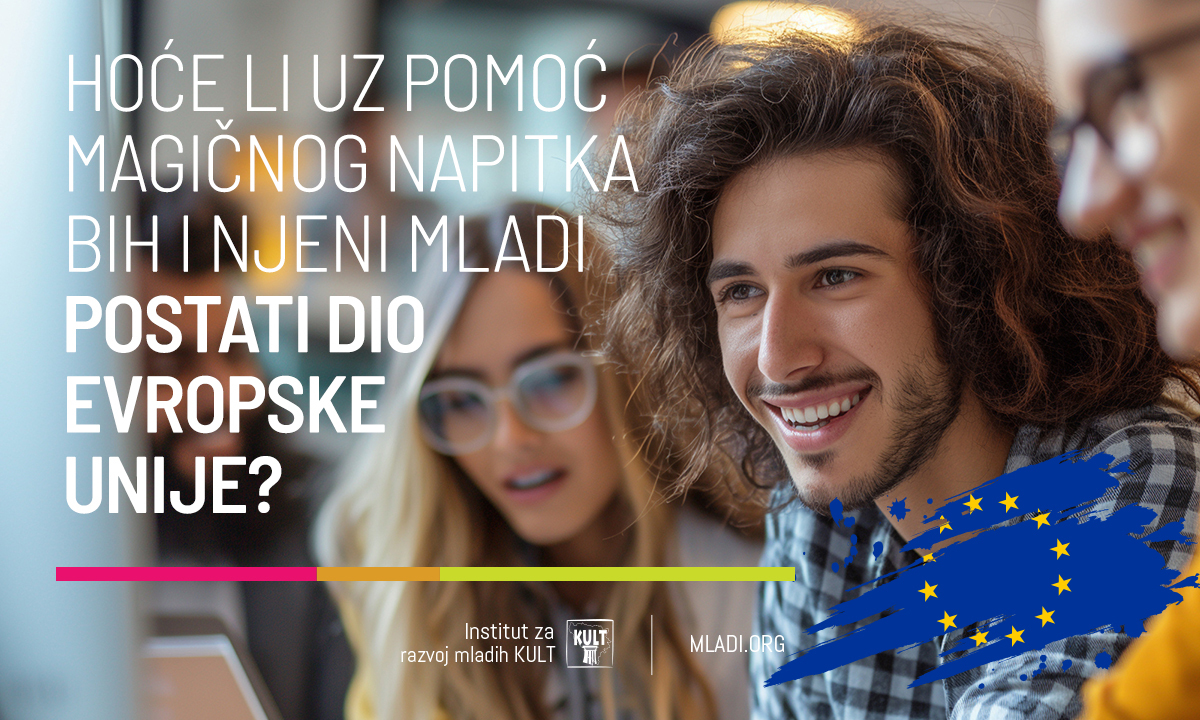according to the research on social inclusion of youth conducted by the Institute for youth Development KULT in the beginning of this year in 12 local communities in BiH, Croatia and Serbia, less than 7% of youth cast their votes according to the election posters.
Public reactions for the occurrences so far regarding the local Elections of 2012 in Bih demonstrate that the campaigns, although often pointless and tacky, do attract attention. The citizens were so far exposed to grammatically incorrect slogans, pornographic content and usurping public areas, listening to loud patriotic songs, motherland sevdalinkas and unrealistic promises and have to put up with raging postering of everything, everywhere on every occasion. The effect of these motley attacks on the will of the electorate will be determined more precisely after the Elections. So far it can be acknowledged that they are often disturbing, and reflect on an occasional existing statistics. Are youth actually influenced by this?
Youth, as Well as the Older and the Old, Vote
Even though it is an accepted opinion that youth do not attend elections, the gathered data demonstrate that the percentage of their attendance in the last general Elections of 2010 was equal to the percentage of attendance of other groups. So, youth do vote, and according to the data by CIK, in 2010, they comprised almost 22% of the total electorate in BiH, almost one whole quarter, or in number: 688,459 votes.
According to the last research of KULT on social in/exclusion (the whole research will soon be available at www.mladi.org), that included both their choice during the process of voting, the posters, in the context of their influence on youth are not an efficient means for an election campaign. Less than 7% of youth vote in accordance with the election posters. Far from the youth being politically developed and that they do not fall under the influence of other types of advertising – 32% of youth use the media as their source of information when choosing, and 29% use the presented political platforms – but they simply do not believe the posters. Or they do not notice them. Some of them consult their parents or friends during their decision-making, and in smaller communities it is common for them to vote for their relatives, friends or acquaintances that are running or have ran for elections. The fact that marketing or someone else’s opinion form their decision and choice makes their vote different from the results they expected. To call a spade a spade, youth are first manipulated, then disappointed, and then disappointed. That is the origin of their incredulousness towards the politicians and politics. The research clearly indicates clearly that youth, preparing for their decision at the elections, are in no manner informed through the reports on the earlier work, financial business management and the efficiency of the institutions and representatives that are published by governmental (e.g. audit offices) and non-governmental organisations that should be the primary source of information for an objective decision on potential representatives. Also, rarely who, or almost no one of youth investigate the success of their local management through the increase or the decrease of its income, i.e. its budget. And for the chairman of a community, this should be the primary task: the increase of income and the correct directing of expenses.
?udo u In?iji (A Miracle in In?ija)
This year most candidates for the municipal head promises all sorts of things. The lack of idea generate promises that cannot be implementable. Those who do not wish to be re-elected that have in the previous period performed the highest local functions, making an alibi for earlier faults but also for caution due to their following engagement, often defend themselves with the lack of liability: they are not liable for public transport, for safety in the streets, for employment, for education, for tourism. Are their hands really tied? What can the municipal government do for the citizens?
With no intention of listing the numerous possibilities of local authorities, from modernisation of administration, creating a soothing business ambiance for foreign investors, fighting internal corruption, incentives to small businesses, over development of non-formal education, financing deficient cadres, to capital investments and possibilities of starting initiatives towards the higher governmental levels for solving problems that are currently not in their jurisdiction – we recommend the show “?udo u In?iji” (“A Miracle in In?ija”) that is available on online television of the Centres for Civil Initiatives inicijativa.tv. It is an interview with the mayor who took the management over his municipality of In?ija in 2000, when he was 26 years old, or, better said, young. He didn’t did not defend himself with liability and did not wait for aid of the higher governmental levels. In 2000 he encountered 12,000 unemployed. Three mandates later, in 2012, the number was reduced to 3,500. He encountered a budget of a little more than 600,000 (six hundred thousand) Euros. Twelve years later, the budget is 30 times greater and amounts to more than 20 million Euros. He never congratulated to the successful students in In?ija, but thanked them and awarded them abundantly. Every village in In?ija has a kindergarten. And public transport that reaches the centre of the city from the furthest location in the municipality for less than half an hour, or accurately 26 minutes, because, as the mayor states, “he has to ensure the mobility of workforce”. There are 800 new workplaces being opened in In?ija this year.
Mind you, In?ija is not in the west, but here, in our neighbourhood. In Serbia. Open for cooperation.
And who would dare to trust the posters and their owners after all this?! You can make useful things as well from paper and glue, you know. But not here. In In?ija.












Leave a comment